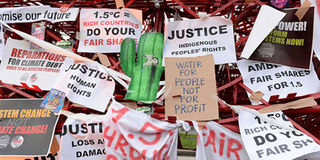UN gives deadline to stop climate change

A picture taken on December 11, 2015 shows banners with messages related to global warming attached to an Eiffel Tower made of bistro chairs at the venue of the United Nations conference on climate change COP21 in Le Bourget, on the outskirts of Paris, on December 11, 2015. PHOTO | MIGUEL MEDINA | AFP
What you need to know:
- He said the report presented an accurate and compelling forecast of what is likely to happen in the event of further global warming.
- The UN is set to meet in December in Katowice, Poland, over the Paris commitments to reduce the emissions curve by 2020.
The world has just 12 years to mitigate the effects of climate change before they become irreversible, a United Nations report has warned.
In a special report released on Monday, the Intergovernmental Panel on Climate Change published its findings on global warming of 1.5 degrees Celsius.
A statement by former UN Secretary-General Ban Ki Moon termed the report a wake-up call to the world, adding that the planet is running out of time in efforts to prevent a global increase in temperatures by up to two degrees Centigrade.
“This report by the world’s leading climate scientists is an ear-splitting wake-up call to the world. It confirms that climate change is running faster than we are — and we are running out of time,” the statement read.
DISASTERS
He said the consequences of climate change are already evident, noting that the report presented an accurate and compelling forecast of what is likely to happen in the event of further global warming.
“We see the consequences all around us — more extreme weather, rising sea levels, diminishing Arctic sea ice. The scientists paint the most vivid picture we have ever had between a temperature rise of 1.5 degrees versus 2 degrees,” he said.
The UN boss said even the slightest increase would have an effect.
“A half of degree of warming makes a world of difference. It means more heatwaves for tens of millions of people, far greater species loss and increased water scarcity in some of the world’s most unstable regions,” Mr Moon said.
EMISSIONS
He further warned of the report’s prediction of “a 10-fold increase in Arctic summers, which would be free of ice, and a total wipeout of the world’s coral reefs”.
At the same time, the report showed that it is still possible to limit warming to 1.5 degrees Centigrade.
Achieving this reduction will, however, require urgent and far more ambitious action to cut emissions by half by 2030 and reach a targeted level of zero emissions by 2050.
The former UN chief said the effort would take what he termed “unprecedented changes in all aspects of society, especially in key sectors such as land, energy, industry, buildings, transport and cities”.
“Specifically, we need to end deforestation and plant billions of trees, drastically reduce the use of fossil fuels and phase out coal by 2050.
"We will also be required to upgrade the installation of wind and solar power, invest in climate-friendly sustainable agriculture, and consider new technologies such as carbon capture and storage.”
The UN is set to meet in December in Katowice, Poland, over the Paris commitments to reduce the emissions curve by 2020.





